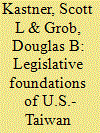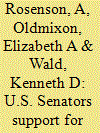| Srl | Item |
| 1 |
ID:
087696


|
|
|
|
|
| Publication |
2009.
|
| Summary/Abstract |
This paper uses the conflict between Hungary and Slovakia over the Gabcikovo-Nagymaros Dam to examine two foreign policy issues. The first is how states determine their interests and how perception of gains and losses arise and change. The second is the reality that international norms are rarely clear and often conflict, making answering questions of whether states have "internalized" or are abiding by norms problematic. This case is a good vehicle for addressing these questions as the dam dispute began during the communist period and has continued through the political and economic transitions to European Union membership. It also was the focus of a groundbreaking International Court of Justice case on the application of ecological necessity to treaty obligations. Fleshing out the model of a two-level game with insights from other theoretical perspectives, this article argues the key to this stalemate is the interrelated process through which state identity and understandings of vital interests change, creating frames in each state around different international norms.
|
|
|
|
|
|
|
|
|
|
|
|
|
|
|
|
| 2 |
ID:
087697


|
|
|
|
|
| Publication |
2009.
|
| Summary/Abstract |
Taiwan remains central to peace and stability in U.S.-China relations, and to prospects for democracy and prosperity in the Far East. The Taiwan Relations Act assigns to the U.S. Congress a greater role in the formulation of U.S. policy toward Taiwan than it exercises in other areas of foreign policy. Within the U.S. House of Representatives, the only organization that is explicitly supportive of a robust U.S.-Taiwan relationship is the Congressional Taiwan Caucus. Yet there exists, to our knowledge, no systematic empirical study of the correlates of Caucus membership. Few studies systematically analyze the factors that impel Members of Congress publicly to take positions that favor Taiwan. This paper addresses that gap with respect to the 109th Congress (2005-2006). We develop a method of analyzing Caucus membership and show that it yields new empirical findings about the micro-foundations of Taiwan policy making in Congress. Unlike previous studies, our unit of analysis is not the legislature, nor the legislative chamber, nor the parties within the chamber. We drill down further, collecting data at the level of the individual Member.
|
|
|
|
|
|
|
|
|
|
|
|
|
|
|
|
| 3 |
ID:
087695


|
|
|
|
|
| Publication |
2009.
|
| Summary/Abstract |
Studies of foreign policy are as eclectic as the states in the global system. This paper attempts to provide a framework to facilitate the comparative study of foreign policy. Based on the original model by McGowan and Shapiro (1973) the expanded model here reflects advances in the understanding of the global system as well as the increased internationalization of domestic actors and events. The model will be illustrated by an analysis of Turkish foreign policy with Syria influenced by Turkey's own Kurdish citizenry.
|
|
|
|
|
|
|
|
|
|
|
|
|
|
|
|
| 4 |
ID:
087694


|
|
|
|
|
| Publication |
2009.
|
| Summary/Abstract |
This article argues that the elevation of preemption to a cardinal status in the Bush Doctrine following September 11, 2001 resulted from a larger strategic consideration-to convince rogue states to discontinue their weapons of mass destruction programs and their sponsorship of terrorism. Dismantling the Saddam Hussein regime in Iraq as a demonstration of preemptive action was seen as necessary to ensure the forceful and credible conveyance of this message to other rogue states, especially Iran and North Korea. I call this strategic logic behind publicizing preemption, "demonstrative compellence." Because the logic of preemption in the Bush Doctrine relied heavily on the Iraq war and its demonstrative force, it has little relevance to the future conduct of U.S. foreign policy and should not be described as revolutionary.
|
|
|
|
|
|
|
|
|
|
|
|
|
|
|
|
| 5 |
ID:
087698


|
|
|
|
|
| Publication |
2009.
|
| Summary/Abstract |
This paper explores Senate policy-making toward Israel from 1993-2002. Previous scholarship suggests that congressional policymaking toward Israel is heavily influenced by the ethnic and religious identification of both legislators and their constituents, not simply by legislators' abstract perceptions of the national interest. Other literature de-emphasizes the likelihood that constituent interests will affect Congressional foreign policy making. We test for an impact of both elite and constituent characteristics on Congressional support for Israel, using sponsorship-cosponsorship decisions in the 103rd-107th Congresses. Israel's strongest supporters in this period are shown to be Jewish, conservative, Republican, and evangelical senators. Notably, elite characteristics (partisanship, ideology, and religion) matter more than constituency factors, with the exception of the Jewish population in senators' home states. While Jewish and conservative senators have long been vocal supporters of Israel, evangelical and Republican senators have not historically taken such a strong pro-Israel stance; hence they are relatively new additions to the active pro-Israel coalition. Thus the pro-Israel coalition shows both continuity and change as it has broadened to include new partners. However, we suggest that this coalition is not necessarily stable and may undergo further evolution in the future.
|
|
|
|
|
|
|
|
|
|
|
|
|
|
|
|